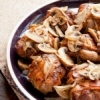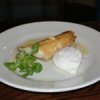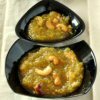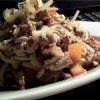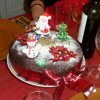BEEF COOKING TIMES

The proper beef cooking times and the correct beef cooking temperatures are extremely important. The optimum flavour and tenderness of various cuts of beef can be consistently achieved when care is taken to follow the recommended time and temperature guidelines for cooking beef.
Using the recommended time and temperature guidelines will ensure that the meat is cooked to the minimum safe internal temperature, which is critical in avoiding food-borne illness that can be caused by undercooked food. Using an accurate meat thermometer is highly recommended.
Whether you are looking for an eye round roast cooking time or a beef tenderloin cooking time, use the following chart as a guide for any roast beef cooking time and cooking temperature. The chart can be used for beef cuts that are oven roasted, pan fried, pan broiled, oven broiled, grilled, or are inserted into an oven bag prior to roasting.
BEEF Cooking Times and Temperatures |
|||||||
| Oven Baked or Roasted Beef | |||||||
| Beef Cut | Oven Temp. |
Weight (pounds) |
Approximate Cooking Time (minutes per pound) | ||||
| Rare 60ºC (140ºF) |
Medium-rare 63ºC (145ºF) |
Medium 71ºC (160ºF) |
Medium-well 74ºC (165ºF) |
Well Done 77ºC (170ºF) | |||
| Standing rib (ribs 6-7 inches long) |
300-325ºF | 6-8 lbs. | 23-25 min. | 24-28 min. | 27-30 min. | 28-34 min | 32-35 min |
| Rib roast (chine bone removed) |
350ºF | 4-6 lbs. | 18-22 min. | 22-26 min. | 28-34 min. | 34-36 min. | 36-38 min. |
| 6-8 lbs. | 15-18 min. | 18-22 min. | 22-28 min. | 28-30 min. | 30-32 min. | ||
| Rib eye roast | 350ºF | 4-6 lbs. | 18-20 min. | 20-22 min. | 20-24 min. | 22-24 min. | 22-26 min. |
| Eye round roast | 325ºF | 2-3 lbs. | 35-38 min. | 35-45 min. | 45-53 min. | 45-60 min. | 55-68 min. |
| Round tip roast | 325ºF | 3-4 lbs. | 28-30 min. | 30-35 min. | 38-45 min. | 45-48 min. | 48-50 min. |
| 6-8 lbs. | 16-18 min. | 18-20 min. | 23-25 min. | 25-28 min. | 28-30 min. | ||
| Sirloin tip | 300-325ºF | 3½-4 lbs. | 35 min. | 36 min. | 38 min. | 39 min. | 40 min. |
| Rolled rib | 300-325ºF | 5-7 lbs. | 32 min. | 35 min. | 38 min. | 43 min. | 48 min. |
| Rolled rump | 300-325ºF | 4-6 lbs. | 25 min. | 26 min. | 28 min. | 29 min. | 30 min. |
| Whole tenderloin | 425ºF | 4-5 lbs. | 45-60 min. total |
50-60 min. total |
60-70 min. total |
||
| Half tenderloin | 425ºF | 2-3 lbs. | 35-40 min. total |
45-50 min. total |
|||
| Meatloaf | 350ºF | 1½ lbs. | 75 min. total | ||||
|
Note: Start with meat at room temperature. Remove the meat from the oven when it reaches | |||||||
| Pan Fried Beef | |||||||
| Beef Cut | Thickness | Approximate Cooking Time (total time) | |||||
| Rare 60ºC (140ºF) |
Medium-rare 63ºC (145ºF) |
Medium 71ºC (160ºF) |
Medium-well 74ºC (165ºF) |
Well Done 77ºC (170ºF) | |||
| Cube steak | ½ inch | 6-8 min. | |||||
| Steak | 1 inch | 8-11 min. | 11-12 min. | 12-14 min. | 14-15 min. | 15-17 min. | |
| Pan Broiled Beef | |||||||
| Beef Cut | Thickness | Approximate Cooking Time (total time) | |||||
| Rare 60ºC (140ºF) |
Medium-rare 63ºC (145ºF) |
Medium 71ºC (160ºF) |
Medium-well 74ºC (165ºF) |
Well Done 77ºC (170ºF) | |||
| Cube steak | ½ inch | 5-8 min. | |||||
| Rib eye steak | 1 inch |
15 min. |
20 min. | ||||
| 1½ inches | 25 min. | 30 min. | |||||
| 2 inches | 35 min. | 45 min. | |||||
| Porterhouse steak | 1 inch | 20 min. | 25 min. | ||||
| 1½ inches | 30 min. | 35 min. | |||||
| 2 inches | 40 min. | 45 min. | |||||
| Chuck blade steak | ¾ inch | 14 min. | 20 min. | ||||
| 1 inch | 20 min. | 25 min. | |||||
| 1½ inches | 35 min. | 40 min. | |||||
| Tenderloin steak | 1 inch | 10 min. | 15 min. | ||||
| 1½ inches | 15 min. | 20 min. | |||||
| Sirloin steak | 1 inch | 20 min. | 25 min. | ||||
| 1½ inches | 30 min. | 35 min. | |||||
| 2 inches | 40 min. | 45 min. | |||||
| Top loin steak | 1 inch | 15 min. | 20 min. | ||||
| 1½ inches | 25 min. | 30 min. | |||||
| 2 inches | 35 min. | 45 min. | |||||
| Top round | 1 inch | 20 min. | 30 min. | ||||
| 1½ inches | 30 min. | 35 min. | |||||
| Flank steak | 1 - 1½ lbs. | 12 min. | 14 min. | ||||
| Hamburger patty* | 1 inch | 8 min. | 12 min. | ||||
| Oven Broiled Beef | |||||||
| Beef Cut | Thickness | Approximate Cooking Time (for each side) | |||||
| Rare 60ºC (140ºF) |
Medium-rare 63ºC (145ºF) |
Medium 71ºC (160ºF) |
Medium-well 74ºC (165ºF) |
Well Done 77ºC (170ºF) | |||
| Steak | 1 inch | 5 min. | 6 min. | 8 min. | |||
| Steak | 2 inches | 16 min. | 18 min. | 20 min. | |||
| Beef Grilled with Medium-high Heat | |||||||
| Beef Cut | Thickness/Weight | Approximate Cooking Time (for each side ) | |||||
| Rare 60ºC (140ºF)* |
Medium-rare 63ºC (145ºF)* |
Medium 71ºC (160ºF) |
Medium-well 74ºC (165ºF) |
Well Done 77ºC (170ºF) | |||
| Rib eye | ¾ inch | 5-7 min. | 6-8 min. | 7-9 min. | 8-10 min. | 9-11 min. | |
| New York strip | 1 inch | 8-10 min. | 9-11 min. | 10-12 min. | 11-13 min. | 12-14 min. | |
| Flank steak | 1 - 1½ lbs. | 10-15 min. | 14-18 min. | 15-19 min. | |||
|
Steaks |
1 inch |
6-7 min. |
6-8 min. |
7-9 min. |
8-10 min. |
9-11 min. | |
| 1½ inches | 10-12 min. | 11-13 min. | 12-15 min. | 14-18 min. | 15-19 min. | ||
| 2 inches | 15-17 min. | 16-18 min. | 17-19 min. | 18-20 min. | 19-22 min. | ||
| Ribs (back) | cut in 1-rib portions | 10 min. | |||||
| Tenderloin | Half: 2-3 lbs. | 10-12 min. | |||||
| Whole: 4-6 lbs. | 12-15 min. | ||||||
| Hamburger patty* | 1 inch thick/6-oz | 4 min. | 5 min. | 6 min. | 7 min. | 8 min. | |
| *Note: Hamburgers should be cooked to at least 71ºC (160ºF) to reduce the risk of food-borne illnesses in small children, the elderly, and those with compromised immune systems. | |||||||
| Note: When grilling with Indirect Heat generally the coals (or burners on a gas grill) are heated to a high heat. When grilling with Direct Heat the coals (or burners on a gas grill) are heated to a medium heat. Use these heat settings unless you have a recipe that states something different.. | |||||||
| Beef Cooked at 160°C (325ºF) in an Oven Bag | |||||||
| Beef Cut | Total Weight |
Approximate Cooking Time (total time) | Add Water to Oven Bag |
Meat Thermometer Temperature | |||
| Regular-Size Oven Bag 10"x 16" |
Large-Size Oven Bag 14"x 20" |
Turkey-Size Oven Bag 19"x 23½" | |||||
| Chuck pot roast (boneless) |
1½-2½ lbs. | 1¾ - 2 hrs. | ½ cup | Fork Tender | |||
| 3-5 lbs. | 2½ - 3 hrs. | ½ cup | Fork Tender | ||||
| Tri-tip roast | 1½ - 2 lbs. | 50-55 min. | None | 63ºC (145ºF) | |||
| Round tip roast (sirloin top) |
3-4 lbs. | 1½-1¾ hrs |
¼ cup |
63ºC (145ºF) | |||
| 4-8 lbs. | 1½-2½ hrs | ¼ cup | 63ºC (145ºF) | ||||
| Eye of round roast | 2-3 lbs. | 1 - 1¼ hrs. | ¼ cup | 63ºC (145ºF) | |||
| 3-5 lbs. | 1¼-1¾ hrs. | ¼ cup | 63ºC (145ºF) | ||||
| Top round (London broil) |
3 - 3½ lbs. | 55-60 min. | ½ cup | 63ºC (145ºF) | |||
| Rump roast | 2-4 lbs. | 1½ - 2 hrs. | ¼ cup | 71ºC (160ºF) | |||
| 4-8 lbs. | 2 - 2½ hrs. | ¼ cup | 71ºC (160ºF) | ||||
| Bottom round roast | 2-4 lbs. | 1½ - 2 hrs. | ¼ cup | 71ºC (160ºF) | |||
| 4-8 lbs. | 2 - 2½ hrs. | ¼ cup | 71ºC (160ºF) | ||||
| Prime rib roast | 2-3 lbs. | ¾ - 1¼ hrs. | None | 63ºC (145ºF) | |||
| 3-5 lbs. | 1½ - 2 hrs. | None | 63ºC (145ºF) | ||||
| Beef rib roast (small end, 4 ribs) |
8-10 lbs. | 2½-2¾ hrs | None | 63ºC (145ºF) | |||
| Brisket (boneless, whole) |
8-10 lbs. | 3 - 3¼ hrs. | ½ cup | Fork Tender | |||
| Brisket (boneless, half) |
2-3 lbs. | 1½ - 2 hrs. | ½ cup | Fork Tender | |||
| 3-5 lbs. | 2½ - 3 hrs. | ½ cup | Fork Tender | ||||
| Corned beef brisket | 2-3 lbs. | 2½ - 3 hrs. | ½ cup | Fork Tender | |||
| 3-5 lbs. | 3 - 3½ hrs. | ½ cup | Fork Tender | ||||
| Oven Bag Instructions: Preheat the oven to 160ºC (325ºF). Add 1 tablespoon flour to the oven bag and distribute evenly on the inside of the bag prior to inserting the beef. Remove the meat from the oven when the meat thermometer reaches the temperature listed or when the meat is fork tender. If using a turkey-size oven bag for a beef cut smaller than 12 lbs., gather the oven bag loosely around the beef allowing room for heat circulation; then close the bag with a nylon tie, and cut away any excess oven bag. | |||||||
How Do I Determine Doneness?
Determining doneness of beef is a stumbling block for many cooks, but it's one that can easily be overcome with a little know-how. The following information should smooth the way to success every time.
Click on the kind of beef to go directly to the desired info.
- Roasts
- Steaks
- Ground Beef (Minced Beef)
- Pot Roast and Beef for Stew
- Beef for Kebabs
- Beef for Stir-Fry
First, recognize that the cooking times in the Beef Cooking Timetables above are not absolutes, even though they are based on extensive industry testing. Rather, they are meant to be used as guides - useful for establishing a work plan and to help determine doneness. Variations in individual animals, size and conformation of a specific cut, as well as differences in cooking equipment, are just some of the factors that contribute to variations in cooking times.
Next, become familiar with the stages of doneness and with cooking thermometers. It will make life a lot simpler.
It's important to be able to recognize the various stages of doneness in beef by appearance.
- Medium rare beef is very pink in the centre, slightly brown toward the exterior.
- Medium beef is light pink in centre, brown toward the exterior.
- Well done beef is uniformly brown throughout.
Roasts
There is no reliable visual indication of doneness for beef roasts, unless you cut into them. While most cooks have an instinctive feel for how long to cook a joint, a meat thermometer is an essential tool for anyone who is new to life in the kitchen. Simply insert it into the thickest part of the roast, not resting in fat or touching bone.
An ovenproof meat thermometer is the most convenient type to use when cooking roasts. It is inserted prior to roasting and left in throughout the cooking process. Alternatively, the instant-read thermometer can also be used to test the internal temperature of roasts, although it can't be left in the meat during cooking. An instant-read thermometer is inexpensive, and has a slim stem that allows for frequent testing with minimal loss of juices. Just push the sensor into the meat, leave for about 15 seconds and check the reading. Once you are satisfied, remove the thermometer and continue cooking if necessary.
To achieve the desired doneness - 63°C (145°F) for medium rare; 71°C (160°F) for medium - remove the roast from the oven when the thermometer registers about 3-5°C (6-10°F) below the required temperature. Let the roast stand in a warm place for at least 15 minutes before carving. The internal temperature will continue to rise (so the meat will continue to cook) during standing and reach the desired doneness.
Steaks
I strongly recommend cooking steaks just to medium rare 63°C (145°F) or medium 71°C (160°F). To taste a steak at it's best, it should not be overcooked.
The most accurate way to determine doneness of steaks is with an instant-read thermometer. This is especially recommended for steaks more than 4cm (1½") thick. Insert the thermometer horizontally from the side, so that the temperature sensitive part of the thermometer penetrates the thickest part (or the centre of) the steak, not touching bone or fat.
To determine doneness visually, make a small slit near the bone, or near the centre for boneless steaks, and check the colour. (You can also use our "touch test" to judge for doneness)
Ground Beef (Minced Beef)
Minced (or ground) beef should be cooked to medium 71°C (160°F) doneness, until it is no longer pink in the centre and the juices show no pink colour. The most accurate way to determine doneness of minced (ground) beef patties and meatloaf is with an instant-read thermometer.
The temperature-sensitive part of the thermometer should penetrate the centre or thickest part of the meatloaf or patty. To test patties, insert the thermometer horizontally from the side into the centre.
Due to the natural nitrate content of certain ingredients often used in meatloaf, such as onions, celery and bell peppers, meatloaf may remain pink even when a 71°C (160°F) internal temperature has been reached. Always check the internal temperature of meatloaf using a meat thermometer or instant-read thermometer to be certain it reaches 71°C (160°F).
Pot Roast & Beef for Stew
Due to the nature of moist-heat cookery, pot roasts and beef for stew will always be well done. You should simmer pot roasts and stewing beef until the meat is fork-tender. An easy test is to insert a double-pronged meat fork into the thickest part of the beef. When the fork can be inserted without resistance and releases easily when pulled out, the beef is done.
Can you overcook a pot roast? Absolutely! Pot roast cooked beyond the fork-tender stage may begin to fall apart and seem more tender. Actually, it is losing moisture, becoming dry, tough and stringy. Do not overcook!
Beef for Kebabs
I recommend cooking beef for kebabs just to medium rare 63°C (145°F) or medium 71°C (160°F) - in other words, do not overcook. To determine doneness, make a small slit into the centre of a beef cube and check the colour.
Beef for Stir-Fry
For best flavour and texture, you should stir-fry beef just until the outside surface of the beef is no longer pink; the centre should be slightly pink. Stir-frying is a very rapid process so be careful not to overcook. Select grade beef is sensitive and can quickly become dry and tough if overcooked.
In case you are unsure about what type of steak to buy, here are two diagrams that may help...
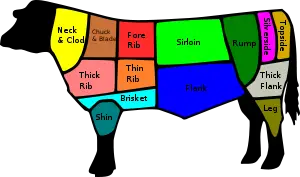 BRITISH BEEF CUTS
BRITISH BEEF CUTS
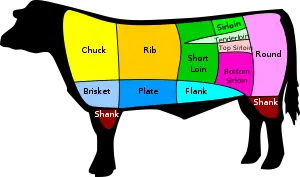 AMERICAN BEEF CUTS
AMERICAN BEEF CUTS
 BRITISH BEEF CUTS
BRITISH BEEF CUTS
 AMERICAN BEEF CUTS
AMERICAN BEEF CUTS
What To Eat Tonight
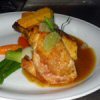
48 Easy Chicken Dinners
Chicken, that most tender and versatile of foods, deserves a place of honor in the chef's 'keepers' file. Take a look at some of these.
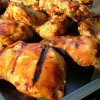
265 Recipes for a Crowd
Having a gang of friends in , or the whole extended family? Need a recipe that's easy to 'extend' to accommodate a bigger group? No problem!
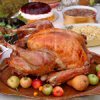
10 Epic Turkey Recipes
Thanksgiving or Christmas are the two traditional times for turkey, but it doesn't have to be that way. We have lots of great recipes.
